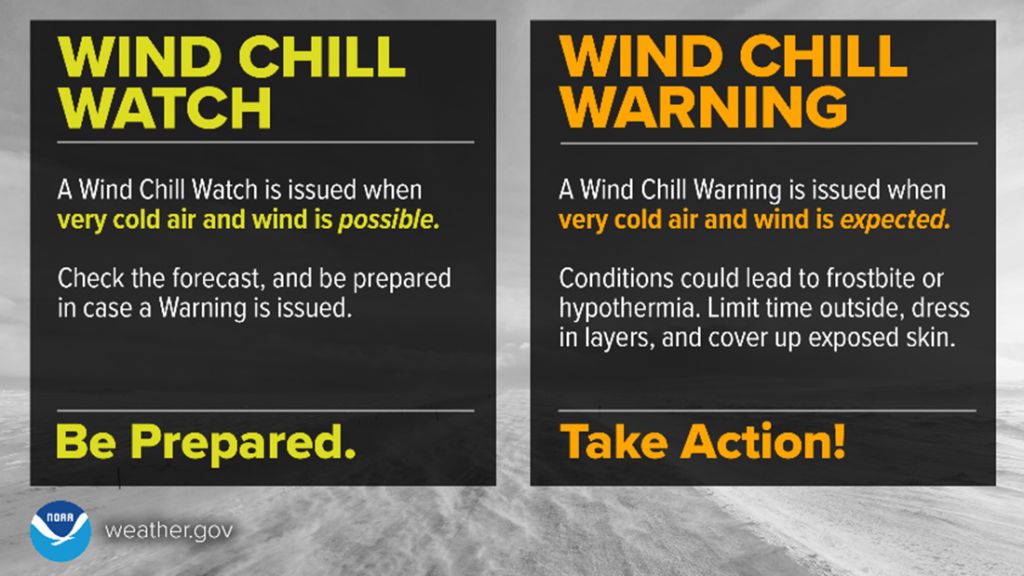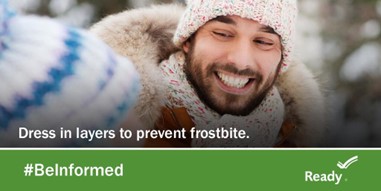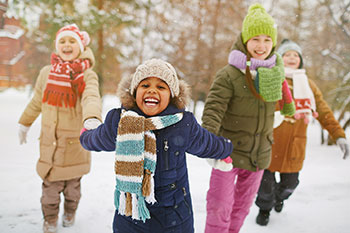It’s Winter Safety Awareness Month
As winter approaches, NYCHA’s Environmental Health and Safety Department and Emergency Management and Services Department want to help you and your family stay safe. Winter storms and extreme winter weather can bring cold temperatures, power failures, loss of communication services, and icy roads and sidewalks – and preparing for them before they’re at your doorstep is the best way to keep yourself and your loved ones safe. Here are some tips to follow:
Plan and Prepare
• Create a communication and disaster plan for your family. Involve your entire family in planning and practicing how to stay healthy, informed, calm, and connected during an emergency. Talk to your children so that they know you are prepared to keep them safe
• Have an evacuation plan and a designated meetup point in case you must leave your building.
• Prepare a kit for emergencies lasting several days that includes:
First aid kit;
Flashlight;
Battery-powered or crank radio (and extra batteries for it);
Charging cables for cell phones;
Bottled water (one gallon of water per person per day in plastic bottles or jugs);
Ready-to-eat foods that do not need a refrigerator;
Personal care items such as toothbrush, toothpaste, and skin wipes;
Extra blankets and warm clothing;
Medications and medication list;
Important documents (such as insurance cards, immunization records, or other health information) in a waterproof bag; and
A listing of important phone numbers: physician, pediatrician, pharmacist, counselor, and veterinarian.
Before a Winter Storm or Cold Weather Emergency
• Stay calm and reassure your children. Talk to them about what is happening (keep it simple).
• Charge cell phones, find flashlights (check batteries), and follow the guidance of local officials and the weather forecast via the internet, radio, or television.
• Sign up for Notify NYC to get emergency alerts from the City.

During a Winter Storm or Cold Weather Emergency
• Avoid unnecessary travel outside.
• Check on neighbors, especially if they are elderly or vulnerable, to make sure they have adequate heat.
• Avoid unnecessarily opening doors or windows.
• Close draperies at night to conserve heat.
• Listen to the radio or television news or visit nyc.gov/severeweather for weather updates.
Heat Safety
• If you lose heat, submit a work order ticket using MyNYCHA or by calling the Customer Contact Center at 718-707-7771.
• Never use the oven or stove to heat your home. Doing so could lead to dangerous levels of carbon monoxide, causing severe illness and potentially death.
• Electric space heaters can also be very dangerous. Never leave space heaters unattended, and turn them off when you leave the room, leave the home, or go to bed. Space heaters should be placed on the floor at least three feet away from flammable materials such as blankets, curtains, and newspapers. Plug them into a wall outlet instead of an extension cord. • Never use a space heater that doesn’t have the Underwriters Laboratories (UL) mark, which shows that the product has been safety tested. Turn a heater off immediately if the cord becomes hot. Ensure heaters have an automatic shutoff feature in case they get tipped over. Do not use kerosene or propane heaters, which are dangerous and illegal for indoor use in New York City.
• Ensure your smoke and carbon monoxide detectors are working.
• If your building loses heat for an extended time, NYCHA may open a local warming center. You can go spend time at the warming center if your apartment feels too cold.
Staying Safe Outdoors
• Dress in layers, cover skin, and limit time outside.
Stay off icy roads.
Prepare your car for winter: Keep your gas tank near full; always have an extra blanket and flashlight in case you get stuck on the road.

Learn About Frostbite and Hypothermia
Frostbite causes loss of feeling and color around the face, fingers, and toes.
• Signs: Numbness; white or grayish-yellow skin; firm or waxy skin.
• Actions: Go to a warm room. Soak in warm water. Use body heat to warm. Do not massage or use a heating pad.
Hypothermia is an unusually low body temperature. A temperature below 95 degrees is an emergency.
• Signs: Shivering, exhaustion, confusion, fumbling hands, memory loss, slurred speech, or drowsiness.
• Actions: Go to a warm room. Warm the center of the body first: chest, neck, head, and groin. Keep dry and wrapped up in warm blankets, including the head and neck.
If you have questions about this or any environmental health and safety matter, please email ehs@nycha.nyc.gov. Residents, employees, and any member of the public can submit environmental health and safety concerns at on.nyc.gov/submit-concern.
For more information on winter safety preparedness, please visit:
• Winter Weather|CDC
• Winter Weather | Ready.gov

